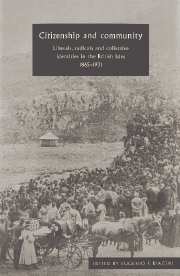 Citizenship and Community
Citizenship and Community Book contents
- Frontmatter
- Contents
- List of contributors
- Acknowledgements
- Introduction: Citizenship, liberty and community
- Part I Citizenship, populism and liberalism
- 1 Liberalism and direct democracy: John Stuart Mill and the model of ancient Athens
- 2 The limits of liberalism: Liberals and women's suffrage, 1867–1914
- 3 Women, liberalism and citizenship, 1918–1930
- 4 Democracy and popular religion: Moody and Sankey's mission to Britain, 1873–1875
- 5 Disestablishment and democracy, c. 1840–1930
- Part II Economic democracy and the ‘moral economy’ of free trade
- Part III Democracy, organicism and the challenge of nationalism
- Part IV Consciousness and society: the ‘peculiarities of the British’?
- Index
2 - The limits of liberalism: Liberals and women's suffrage, 1867–1914
Published online by Cambridge University Press: 16 September 2009
- Frontmatter
- Contents
- List of contributors
- Acknowledgements
- Introduction: Citizenship, liberty and community
- Part I Citizenship, populism and liberalism
- 1 Liberalism and direct democracy: John Stuart Mill and the model of ancient Athens
- 2 The limits of liberalism: Liberals and women's suffrage, 1867–1914
- 3 Women, liberalism and citizenship, 1918–1930
- 4 Democracy and popular religion: Moody and Sankey's mission to Britain, 1873–1875
- 5 Disestablishment and democracy, c. 1840–1930
- Part II Economic democracy and the ‘moral economy’ of free trade
- Part III Democracy, organicism and the challenge of nationalism
- Part IV Consciousness and society: the ‘peculiarities of the British’?
- Index
Summary
For the cause of female enfranchisement British liberalism has provided a complete spectrum from heroism to villainy. In the 1860s John Stuart Mill gave the cause a crucial respectability at a point when it seemed likely to be buried in derision. But, at the other extreme, a Liberal Prime Minister, H. H. Asquith, saw fit to adopt an extraordinarily illiberal method of dealing with the suffragettes – the notorious ‘Cat and Mouse’ Act of 1913–14. To say the least, relations between Victorian liberalism and the women's movement were complicated. In this essay we will begin by considering the common ground between the two and the successes achieved; secondly, we will analyse the difficulties and obstacles to cooperation; thirdly we will consider how political developments during the later 1880s and 1890s further undermined Liberal sympathy for suffragism; and finally we will examine the role of local government in helping to put women's enfranchisement into the mainstream of liberalism in the years before 1914.
Much of the original momentum behind early Victorian feminism derived from female involvement in a range of moral causes including anti-slavery, temperance, peace and anti-vivisection. Prior to 1832 a number of women became active participants in reform associations and subsequently in the Chartist movement where their presence was considered by some to be advantageous precisely because of their known association with moral crusades. Women also proved themselves by their success in collecting funds, their contribution to the social life of the movement and their ability to practise exclusive dealing against shopkeepers.
- Type
- Chapter
- Information
- Citizenship and CommunityLiberals, Radicals and Collective Identities in the British Isles, 1865–1931, pp. 45 - 65Publisher: Cambridge University PressPrint publication year: 1996
- 2
- Cited by


